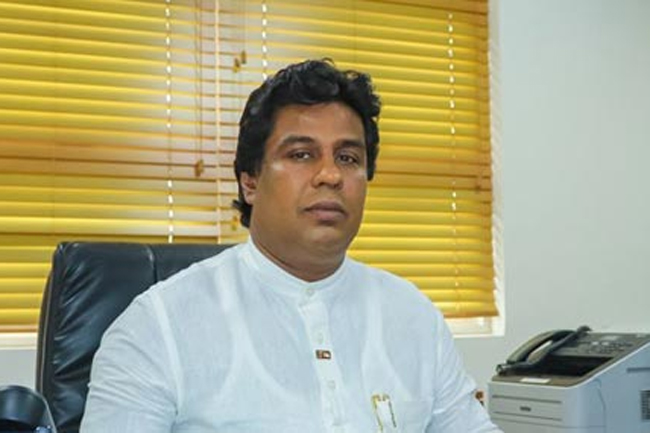News
Prez should explain why he scrapped time-tested exchange controls – NFF

By Shamindra Ferdinando
President Ranil Wickremesinghe, who is also the Finance Minister, should take immediate steps to restore the provisions of Exchange Control Act (ECA) of 1953 as part of the overall efforts to stabilise the national economy, NFF MP Jayantha Samaraweera told The Island yesterday (09).
The former State Minister said that furthermore UNP leader Wickremesinghe owed an explanation as to why his government introduced the current Foreign Exchange Act in 2017. The Kalutara District lawmaker said that President Wickremesinghe couldn’t remain silent as it was his government that disposed of the Exchange
Control Act of 1953, thereby paving the way for exporters to park export proceeds running into billions of dollars abroad.Responding to queries, MP Samaraweera said that he had raised the accountability on the part of President Wickremesinghe in parliament on March 08.
Acknowledging that though the economic situation had slightly improved over the past several weeks, MP Samaraweera said that Wickremesinghe-Rajapaksa government should take remedial measures to plug the loopholes or face the consequences. “The current Exchange Act introduced during Ravi Karunanayake’s tenure as the Finance Minister is perhaps one of the major reasons for the continuing crisis,” the former JVPer said.
The issue at hand was whether somebody in the yahapalana government benefited by repealing the time-tested exchange control laws, MP Samaraweera asked, underscoring the need to examine this matter carefully. “The possibility of a conspiracy cannot be ruled out. All of us know how the UNP perpetrated Treasury bond scams, twice, in Feb 2015 and March 2016. The new Exchange Control Act was enacted in the wake of Treasury bond scams,” MP Samaraweera pointed out.
Referring to a statement made by Trade Minister Nalin Fernando in Parliament on Wednesday, MP Samaraweera said that the government had lost the wherewithal to meet its basic obligations as it didn’t have foreign exchange.
Now, the UNP leader who created an environment for exporters not only to stash away export proceeds overseas and oversaw the Treasury bond scams, held the finance portfolio, MP Samaraweera said. Wickremesinghe should set a deadline for restoring the old Foreign Exchange Act, the MP said, recalling how the UNP leader publicly acknowledged the need to amend the 2017 Act.
MP Samaraweera told parliament on Wednesday President Wickremesinghe couldn’t afford to turn a blind eye to the declaration made by Justice Minister Dr. Wijeyadasa Rajapakse, PC, early last December on the basis of disclosure made by the US-based Global Financial Integrity watchdog that as much as USD 58 bn were parked overseas.
The MP pointed out that in addition to Minister Rajapakse, Opposition lawmakers Vasudeva Nanayakkara, Wimal Weerawansa and Gevindu Cumaratunga, in Parliament, estimated the stashed amount at over USD 35 bn, MP Jayaweera said. The trio has alleged that the Exchange Control Act No 12 of 2017, enacted during the yahapalana administration, allowed exporters to keep funds overseas.
MP Jayaweera said that President Wickremesinghe should inform the parliament without further delay how he intended to address the issue. “We obtained about USD 4 bn in 2022 from India. On top of that Sri Lanka owes the world as much as USD 53 bn. No one should forget that the situation stabilised to an extent as a result of Sri Lanka halting debt servicing,” MP Samaweera said.
Asked why President Gotabaya Rajapaksa’s government didn’t amend the yahapalana Exchange Control Act, MP Samaraweera said that NFF leader Wimal Weerawansa had taken up the issue with the Cabinet-of-Ministers. However, Basil Rajapaksa, who succeeded Mahinda Rajapaksa as the Finance Minister in June 2021 had dismissed the NFF’s recommendation, MP Samaraweera said, adding that Basil had declared that restrictions would discourage exporters. In fact, General Secretary of the Democratic Left Front (DLF) Vasudeva Nanayakkara proposed the introduction of a ‘QR’ system in 2021 in view of the foreign exchange crisis, MP Jayaweera said. That proposal, too, was rejected by Basil Rajapaksa, he said.
The MP stressed the need to tackle quite a formidable challenge posed by well-organised influential public–private sector partnership engaged in ‘over invoicing’ and ‘under invoicing’, with the blessing of successive governments. That too contributed to the forex crisis, the MP said.
News
New thrust on bribery nets former ministers and cronies

The Commission to Investigate Allegations of Bribery or Corruption (CIABOC) sources said that plans were afoot to file charges in connection with 15 major fraud and corruption cases in the near future.
The Commission sources said that these cases stem from thorough investigations into complaints that had previously gone unexamined, with recent file reviews prompting the decision to proceed with legal action. The forthcoming charges are based on detailed inquiries that uncovered substantial evidence pointing to serious misconduct.
To date, CIABOC has initiated inquiries into over 300 complaints received during the recent period, reflecting an expanded commitment to tackling corruption at multiple levels of governance.
Commission sources said that several former ministers and political affiliates from past administrations are among those implicated in the ongoing investigations, though specific names have yet to be disclosed.
News
Online shoppers stick to cash on delivery amid digital payment hesitation

Despite global shifts toward digital transactions, Cash on Delivery (COD) remains the dominant payment method for online shopping in Sri Lanka, according to the Digital Outlook Sri Lanka 2025 Report by the Asia Pacific Institute of Digital Marketing (APIDM) and the University of Kelaniya.
The report reveals that 52 percent of Sri Lankan online shoppers prefer COD, up from 48 percent in the previous year, underscoring persistent consumer caution toward digital payments.
While debit/credit card usage has dipped slightly to 35 percent (from 39.5 percent last year), newer digital payment methods such as e-wallets/e-money apps lag at 1 percent or less. Installment-based “Buy Now, Pay Later” options account for 3 percent, reflecting modest traction. Online bank transfers, meanwhile, accounted for 8 percent (down from 9 percent last year).(aayubo.com)
News
Recruitment initiative to address shortage of academics

The Ministry of Education, Higher Education, and Vocational Education has launched a recruitment initiative aimed at addressing critical shortages in university academic staff across the country.
Deputy Minister Dr. Madura Seneviratne said that the recruitment process is being implemented at the university level to ensure that pressing needs are addressed efficiently and in alignment with institutional priorities.
The move comes in response to growing concerns raised by the Federation of University Teachers’ Associations (FUTA), which has pointed out that nearly 2,000 essential faculty positions remain unfilled across the country’s public universities, potentially impacting the quality of higher education and research output.Deputy Minister Seneviratne said that the recruitment process will be prioritized based on the urgency and significance of vacancies within individual universities and departments.
By Chaminda Silva
-

 News5 days ago
News5 days agoJapan-funded anti-corruption project launched again
-

 Sports4 days ago
Sports4 days agoOTRFU Beach Tag Rugby Carnival on 24th May at Port City Colombo
-

 News5 days ago
News5 days agoSethmi Premadasa youngest Sri Lankan to perform at world-renowned Musikverein in Vienna
-

 Business5 days ago
Business5 days agoNational Savings Bank appoints Ajith Akmeemana,Chief Financial Officer
-

 News2 days ago
News2 days agoRanil’s Chief Security Officer transferred to KKS
-

 Features3 days ago
Features3 days agoThe Broken Promise of the Lankan Cinema: Asoka & Swarna’s Thrilling-Melodrama – Part IV
-

 Features4 days ago
Features4 days agoTrump tariffs and their effect on world trade and economy with particular
-

 News3 days ago
News3 days agoRadisson Blu Hotel, Galadari Colombo appoints Marko Janssen as General Manager





















